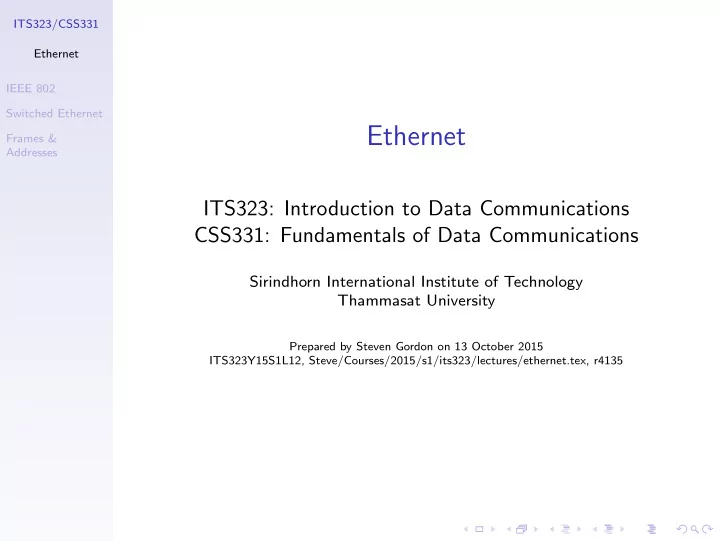

ITS323/CSS331 Ethernet IEEE 802 Switched Ethernet Ethernet Frames & Addresses ITS323: Introduction to Data Communications CSS331: Fundamentals of Data Communications Sirindhorn International Institute of Technology Thammasat University Prepared by Steven Gordon on 13 October 2015 ITS323Y15S1L12, Steve/Courses/2015/s1/its323/lectures/ethernet.tex, r4135
ITS323/CSS331 Contents Ethernet IEEE 802 Switched Ethernet Frames & IEEE 802 LANs Addresses Switched Ethernet Ethernet Frames and Addressing
ITS323/CSS331 IEEE 802 LAN Architecture Ethernet ◮ Institute of Electrical and Electronics Engineers: IEEE 802 professional and standards organisation Switched Ethernet ◮ 754 (Floating Point Arithmetic), 828, 829, 830, Frames & (Software Development), 1003 (POSIX), 1076 (VHDL), Addresses 1363 (Cryptography), 1394 (Firewire), . . . ◮ IEEE 802: LAN/MAN standards committee ◮ Developing standards for PANs, LANs, MANs, WANs ◮ Divided into numbered working groups ◮ IEEE 802 standards focus on: ◮ Physical (PHY) layer ◮ Data link (DL) layer ◮ Medium Access Control (MAC): efficient data transfer, sharing the medium ◮ Logical Link Control (LLC): addressing, connecting to other networks ◮ IEEE 802.3 (Ethernet), IEEE 802.5 (Token Ring), IEEE 802.11 (WiFi), IEEE 802.15.1 (Bluetooth), IEEE 802.16 (WiMax), . . .
ITS323/CSS331 IEEE 802 LAN Architecture Ethernet IEEE 802 Switched Ethernet Application Frames & Addresses Transport IEEE 802 Architecture Network 802.2 LLC Data Link 802.3 MAC 802.5 MAC 802.11 MAC 802.16 MAC ... Physical 802.3 PHY 802.5 PHY 802.11 PHY 802.16 PHY Ethernet Token Ring WiFi WPAN WiMax Fast Ethernet Bluetooth Gigabit Ethernet WMAN Mesh Networks LLC = Logical Link Control MAC = Medium Access Control PHY = Physical
ITS323/CSS331 IEEE 802.3: Ethernet Ethernet ◮ Ethernet developed for LAN communications in 1970’s; IEEE 802 standardised as IEEE 802.3 in 1983 Switched Ethernet ◮ Several competing technologies at the time: Token Frames & Addresses Ring, Token Bus ◮ Ethernet became most popular and now most common LAN standard ◮ Evolution of Ethernet: ◮ Ethernet (’73): 3 Mb/s, coaxial cable, bus topology, half-duplex, shared medium ◮ Ethernet II (’83): 10 Mb/s ◮ Fast Ethernet (’87): 100 Mb/s, twisted pair, star topology with hub ◮ Switched Ethernet (’90): 100 Mb/s, full duplex, star topology with switch, point-to-point links ◮ Gigabit Ethernet (’99): 1 Gb/s, twisted pair or optical fibre ◮ For data centres, MANs and WANs: 10 Gb/s, 40 Gb/s, 100 Gb/s, 400 Gb/s
ITS323/CSS331 Contents Ethernet IEEE 802 Switched Ethernet Frames & IEEE 802 LANs Addresses Switched Ethernet Ethernet Frames and Addressing
ITS323/CSS331 Switched Ethernet Ethernet ◮ Most LANs today use Ethernet in a star topology IEEE 802 ◮ Centre device is called switch (different from a hub) Switched Ethernet ◮ Key characterstics of today’s LANs: Frames & Addresses ◮ Stations have full-duplex, point-to-point links to switch ◮ Twisted pair cable (Category 5 UTP) ◮ Data rate: 100 Mb/s or 1 Gb/s (auto-negotiation) ◮ PHY standard: 802.3u (100BASE-TX) or 802.3ab (1000BASE-T) ◮ Distance: 100 m ◮ Random access is not used
ITS323/CSS331 Switched Ethernet Topology Ethernet IEEE 802 A B Switched Ethernet Frames & Addresses F switch C E D ◮ Stations (hosts, routers) connect via full-duplex twisted pair to switch ◮ Switch has multiple ports, e.g. 4, 8, 24, 48 ◮ All frames between stations pass via the switch
ITS323/CSS331 Contents Ethernet IEEE 802 Switched Ethernet Frames & IEEE 802 LANs Addresses Switched Ethernet Ethernet Frames and Addressing
ITS323/CSS331 IEEE 802 Addresses Ethernet ◮ IEEE 802 standards use common IEEE 48-bit address IEEE 802 format Switched Ethernet ◮ Commonly called MAC or hardware addresses Frames & Addresses ◮ Globally unique (ideally) ◮ First 24-bits assigned by IEEE to manufacturer http://standards.ieee.org/regauth/oui/ ◮ Second 24-bits assigned by manufacturer to device ◮ For simplicity, represented as 6 × 2 digit hexadecimal numbers, e.g. 90:2b:34:60:dc:2f ◮ Special case broadcast address: ff:ff:ff:ff:ff:ff ◮ Common in other standards: Bluetooth, ATM, FDDI, FibreChannel ◮ IEEE 64-bit address is alternative format: Firewire, ZigBee, IPv6
ITS323/CSS331 IEEE 802.3 Frames Ethernet IEEE 802 46 to 6 Bytes 6 Bytes 2 Bytes 1500 Bytes 4 Bytes Switched Ethernet Frames & Destination Source Ether CRC Addresses Data Address Address Type Checksum ◮ Typical maximum data size is 1500 Bytes (optional Jumbo frames) ◮ 1st 8 bytes (preamble, delimiter) sometimes considered part of Physical layer
ITS323/CSS331 Example Hardware Addresses Ethernet f0:de:f1:01:23:45 8c:a9:82:67:89:ab IEEE 802 Switched Ethernet A B Frames & Addresses f0:b4:79:ef:01:23 ec:c8:82:cd:ef:01 F C switch E D f0:de:f1:89:ab:cd 20:cf:30:23:45:67 ◮ Hardware (MAC) addresses are assigned to LAN card by manufacturer ◮ Each station (hosts and routers) has address for each network interface card
ITS323/CSS331 Example MAC Table used by Switch Ethernet IEEE 802 f0:de:f1:01:23:45 8c:a9:82:67:89:ab Switched Ethernet A B Frames & f0:b4:79:ef:01:23 ec:c8:82:cd:ef:01 1 2 Addresses 6 F switch C 3 5 4 MAC Table of switch Port HWaddress 1 f0:de:f1:01:23:45 E D 2 8c:a9:82:67:89:ab 3 ec:c8:82:cd:ef:01 f0:de:f1:89:ab:cd 20:cf:30:23:45:67 4 20:cf:30:23:45:67 5 f0:de:f1:89:ab:cd 6 f0:b4:79:ef:01:23 ◮ Switch learns address of station at other end point of link ◮ Store address and port in memory; used for forwarding frames
Recommend
More recommend